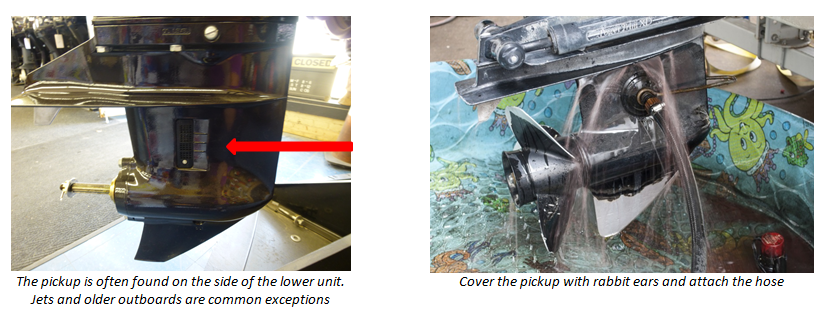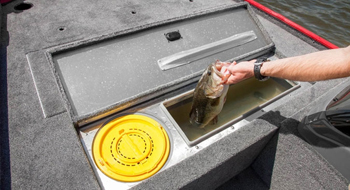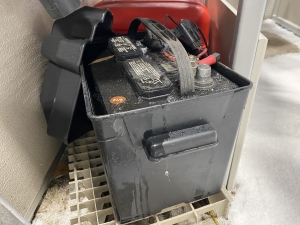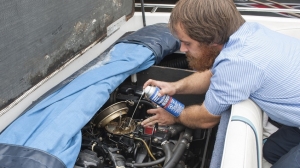Displaying items by tag: maintenance
BOAT BATTERY STORAGE: OFF SEASON TIPS
One of the most frustrating things that can happen to you when you're finally ready to leave the dock is a motor that wont start due to your battery. If you're an avid boater, chances are you have been there and know exactly what I am talking about. Whether you forgot to charge it from the time before or you didn't properly store it in the off season, theres no doubt that it will totally wreck your day. One of the best things you can do for your battery is to properly store it during the winter months to ensure your not dead on the water next spring.
SPRING TRAINING - GET YOUR BOAT IN SHAPE!
With these warmer temperatures, our eye is on the prize – boating season! And when that first nice day arrives, it’s temping to hit the water immediately, wing it, and hope for the best. However, doing this often leads to breakdowns and a slow joy-ride as you’re being towed back to your launch point. Do yourself a favor and prepare your vessel the right way. It is best to have a certified mechanic complete any pre-seasonal maintenance, but if you’re more of a do-it-yourselfer – no worries. The steps below will provide a few basic (but crucial) things to check before your first launch. Pre-season maintenance will vary depending on different models, sizes, years, etc. Please be sure to check your owner’s manual to complete the manufacturer’s recommended maintenance.
Tips on Winterizing Your Boat
The stuff that floats your boat during the summer can cause major league damage to your craft during the winter.
Damage from freezing is all related in one way or another to presence of unwanted water. The same tremendous force that can cause roads to buckle and building foundations to heave is the culprit behind everything from damaged boat hulls to cracked engine blocks.
So whether you are a first-time boat owner or a veteran of boating, here's a checklist of ways to prevent winter’s freezing temperatures from damaging your craft.
Boat Maintenance - 3 Spots Not to Miss
Somethings are out of sight, out of mind - a boat's accumulation of bacteria, grease, or odor should not be one of those things. There are a few covered parts of a boat that really need to get some attention in order to keep your boat in good shape. Often, the places you can't see are the places that could use the most TLC; like the live well, bilge, or gunk that collects in your engine. Cleaning and maintaining the cleanliness of your boat and outboard can be easy and worth it.
Maintaining your engine
All maintenance serves the same purpose; it helps avoid damages while also getting the most out of your outboard's performance. When it comes to boats and motors, a shiny exterior is nothing without a shiny interior. Cleaning your engine is important regardless of what kind of water you are cruising through. De-greasing the inside of your engine and removing all the gunk and dirt should become an annual part of your end-of-season care. Using an anti-corrosive, like WD-40, helps remove all the possibly troublesome grime from your engine.
Once you have a sparkling engine interior, flushing out your outboard with fresh water helps maintain a healthy engine. If you're cruising through salt water, flushing is recommended after every use. Left over salt sitting in your engine can be harmful. Even when going through fresh water, if it is especially sandy or dirty, flushing after use is a good precaution. Flushing is also helpful because it helps your engine cool down. With a set of engine ear muffs and a garden hose, flushing out your engine can be quick and painless. Attach ear muffs to your lower unit so they're covering the pickup, attach the garden hose to the side of the ear muffs, and start flushin'. With the engine and garden hose both running, the water is sucked up by the fuel pump and through the engine. By flushing regularly and keeping up with consistent engine maintenance you can prevent issues before they get too major.
Maintaining your bilge & livewell
The bilge of your boat can have an odor, collect bacteria, or rust and corrode the equipment that sits there. With that being said, it's clear why keeping your bilge clean is advised. Bilges can get dirty and not all sections of the bilge are easy to reach, but cleaning all of the areas you can will make a huge difference.There are different options for bilge cleaner, but going with a biodegradable cleaner can have advantages. Products that aren't biodegradable can harm the water; they require careful use. With a biodegradable cleaner you don't have to be quite as cautious. After applying the cleaner, let it soak before scrubbing: why not let the cleaner do some of the work for you? Letting it sit and soak gives it a chance to de-grease, making the rinse easier.
How many times have you caught a fish, put it in the live well, took the fish out, and gone about your business? Probably atleast a few times. How many times have you given your live well a good scrub-a-dub? Hopefully at least a few times. Fish aren't clean by any means, so chances are your live well isn't either. Probably one of the easiest things to clean, the live well only requires a little scrubbing with anti-bacterial soap. After washing, especially before boat storage, make sure your live well is dry. Storing a boat with a wet live well, even clean moisture, can easily grow bacteria and reverse your hard work.

A nice boat can help ensure weekend plans, fresh fish dinners, and bragging rights. A dirty boat, on the other hand, can potentially lead to odorous boat rides or hefty mechanic bills. No doubt keeping your boat and outboard clean will definitely pay off. Stop by or call Van's Sport Center with any questions or boating needs!




